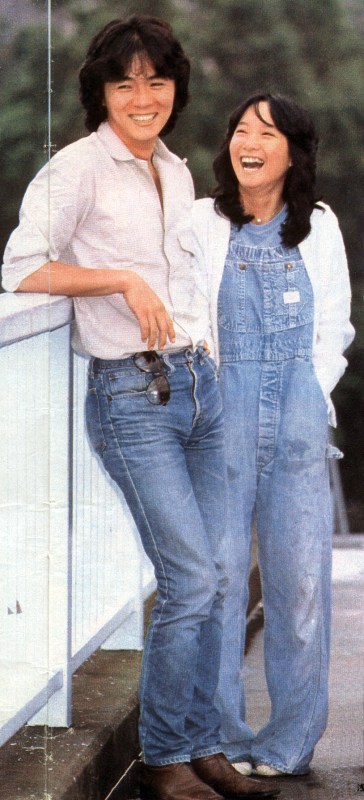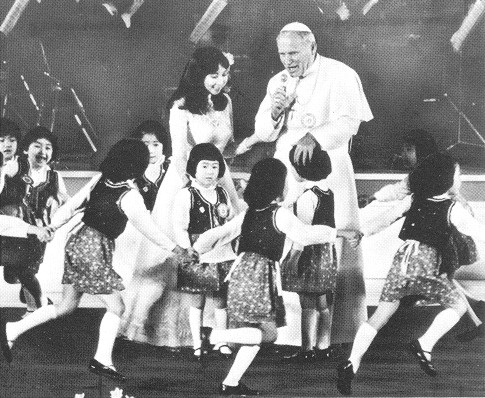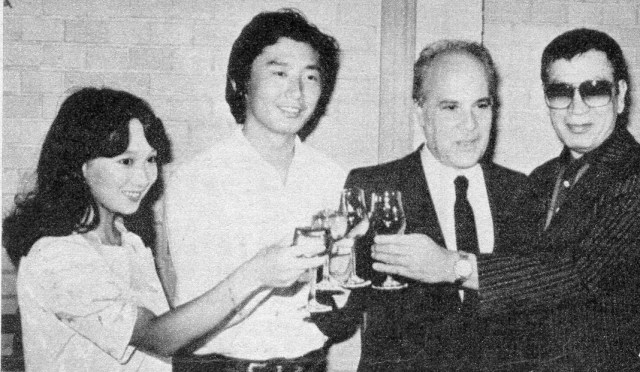
Chapter 9
Agnes was very active. She became a full-time singer and began to pursue her world of music. What accelerated her pursuit was the transfer of her record company that happened shortly after her returned to Japan.
As I mentioned in the previous chapter, the Watanabe Agency has established a new record company, Sound Marketing System (SMS) in September 1979. However, she has not been informed in advance about the transferring to this new company. At first, she was quite upset about what the agency did. But soon after she had found that with the new company, she was able to get involved with the production of her records than before. She said that "...the additional responsibility is mean that I will have a chance to get involved with the production of my own records. I'm getting older and I believe in the sense of my music. I used to follow other people's directions and as that seem to work then, I continued to be lenient when it came to decision-making. Since coming back from Canada though, I have had more to say in my songs. I have enjoyed my work much more."
Some staffs that used to work with Agnes when she was with Warner Pioneer, have also transferred to SMS. Mr. 細井虎雄 Torao Hosoi, who was her music director, was one of them. He talked about the style of her music during the Warner Pioneer years that “we had an intention to produce “Agnes Sounds”--a folk pop sound, similar to the sounds of Olivia Newton-John, Simon & Garfunkel, Carol King and Mary Hopkin.
It could be because she is a Leonian, but she is a person who hates to lose and expresses her opinions more than other persons might. So, we're sensitive to her, but such tension is necessary. ... We'd like to make her to become a successful singer who can express her own individual. Agnes opened the world of her own, surrounding by these people.
She stayed at a hotel after she came to Japan in August, but moved into a condominium in Minami-Aoyama a month after and get into the full swing of music. Her music has a new direction, new color. As a pioneer who made a connection between Japanese Pop and new music. She herself seemed to like to be seen as a new music artist.
She released works full of urban taste one after another, using the leading new
music artists at the time, including 吉田拓郎 Takuro Yoshida,松任谷正隆 Masataka Mattoya and ゴダイゴ Godiego.
In 1979, She signed with Crown Record, Hong Kong (later to the Capital Artists, Hong Kong) and resumed her activities in Asia with a center in Hong Kong. She recorded Cantonese and Mandarin versions of her Japanese Pop. She contributed this style of Cantonese Pops, which became widely popular at that time.
She was not only recorded love songs, but also songs that giving out a massage, such as a song to aid Cambodian refugee, in addition to her English songs for kids. To make this kind of music is like dream came true for her. And it was a straight representation of her own feelings that she has tried to live and stand firmly not just a trend.
She also has changed her personal life. Her two years as a student in Canada made her grow up in her spiritual side. Many people around her said that "She's become more cheerful than before." And a man came before her. He was a singer and songwriter. The relationship between her and him began when he invited her to his late-night radio show in August 1978, shortly after her comeback.
He had yearned for her since her debut in Japan. And she attracted not only to his music, but also to him, as a man because of his nature character. They had developed a relationship; she would invite him to her condominium for a dinner, her home in Hong Kong and introduced him to her mother. But the relationship was not developed into love relationship. However, this experience must have made her grow up not only as a human, but also as a woman. Furthermore, it must have a positive impact on her music in a big way.

Agnes with him
Thus, Agnes steadily grew up and went forward as a singer or music artist. It seemed that she saw bright prospects for her musical works. However, from the commercial aspect, her works after comeback were not a successful one. Her comeback concert tickets were sold only 70-80 %. Although, there were over 8,000 fans at her first comeback concert at Budo-kan, but it was only about 800 fans at Kanazawa, less than 50% of the hall— 1,754 seats, this is also because of a typhoon on the day.
Her first single "Again" released after her comeback sold 100,000 copies, but after that, the sales were rapidly decreased. "100万人のジャバウォーキー Hyakuman-nin no Jabberwocky" released in 1979 was her last hits on chart. And she had no hit right after "愛のハーモニー Ai no Harmony." This is hard to imagine from the viewpoint of her popularity before the retirement. It was a changing of the audiences, not a performer. After all, her two years absence is not a long time at all.
Agnes also realized the sales of the single, have an impact on her future LP and Concerts. There was no question that she had a confident in her songs and also as a musician. But she was puzzled for the songs that did not become hits, or those were accepted by general public. If she could not get a good result, she might not qualify to be as singer because she was professional. With an inner impatience, she confronted her suspicion. “Perhaps, I don’t make a cut as a singer”
On the other hand, her Agency also considered that in order to bring the sales up. One of them was to bring audience's attention by trying to change her image. It was also unrelated to that she had shorten her hair; she cut them off about 15 cm. She had reached the age of mid 20's and they wanted her to be a mature singer. And improbably, it's said there was a man who approached her like doing sexual harassment, under the veil of that.
Many and various works were brought to Agnes via her manager. However, she did not accept anything. She did not try to accept just anything unless she is committed to. This is because she become a very self conscious, had confidence in her music and appealed her own opinions to people around her. When she enjoyed high popularity before she went to Canada to study, it may have been possible, but she could not be allowed to pick and choose her jobs at her situation at the time. So, the agency could not help but angry with her attitude.
What did she want to do? Her hope was to engage in some sort of volunteer works. Actually, she appeared on the "Charity Concert for Cambodian Refugee Aid" held in Hong Kong in January 1980. And she herself held the "Charity Concert for Cambodian Refugee Aid" and "Charity Concert for Indochinese Refugee Aid" in Japan in 1981. However, unfortunately it could not be said that there was many interest and understanding about volunteer in Japan at the time.
The Nippon TV network’s special program " 24時間テレビ 24 hours TV", started in 1978, helped to lift such sense, but the majority deemed the program was just a show. The program could not have the importance of volunteer activity take too soon. Especially, there was a tendency that talent's volunteer activity was deemed as an act of self-promotion.
This was seen in some coverage that 黒柳徹子女史 Miss Tetsuko Kuroyanagi, an actress, was assigned as a goodwill ambassador of UNICEF, 1984.Therefore, the agency must have had no choice, but think twice about putting the volunteer activity at the center of her activity, even though it was her desire.
Actually, she released her first message song "ぼくの海 boku no umi" and included it in her album "Message", but it did not attracted any public attention. As a result, she stopped released this kind of songs.
She always used her songs as a tool to convey and as a mean to have dialog or connect with people”. The reason why she gave up her message song was also due to the thought. She got a broader point of views during her study in overseas. She had a keen interest in war and children as well as the current affairs. Therefore, she had many messages she wanted to convey. She wanted to help the weak and the poor with her volunteer works.
She wanted people to know about them through her songs and she also wanted to reach more people. Maybe, these should have been her wish and ideal. In short, she wanted to act as a messenger to appeal for the current situation of the weak and the poor.
However, she almost forgot the important of songs are to comfort, heal, eased up sorrow as well as bring joy and hope for tomorrow. These things can not be done through the massage songs. And she was about to let pass that those were firstly needed for them. It was a little later when she again laid eyes on another aspect of the important role of song.
On the other hand, Agnes also thought she wanted to pursue her ability as a musician. She became positive about making her own music including writing and producing them. But it was not an easy opportunity for her because the sales of her single records that was a basic matter, was not as good as she wished.
Actually, though she released 22 LPs in Japan during the 8 years period, from "ハッピー・アゲイン Happy Again" to "City Romance,". The eight LPs of the total 22 LPs were compilations and 4 of the remaining were reissued of the Warner Pioneer years-- they were the "heritages of the past." Her anxiety that the slow sales of her single made the LP recording decrease, was translating into reality. However, the circumstance of her activity in Hong Kong was different than in Japan. The 8 LPs she released in from 1979 to 1985 were mostly original compositions, with some covers here and there.
Her activities except her musical continue to increase in 1980. In the face of her flagging activities as a singer, or to be honest, because her activity as a singer was flagging. Those were activities as a so-called "タレント, tarento (talent)." Those activities emphasized her not only as a musician but also as a "foreigner, "bachelor" or "Christian."
In May 1979, Agnes ran the 70 minutes course "歌で聞かせる英語講座, the English course with Song" for 1,000 students at Waseda University. In April the following year, she ran the similar course for her 100 fans at Kudan, Tokyo. For children, she gave an English course on the children's TV program "ワンツージャンプ One Two Jump!" in summer 1979. And she released her second English textbook in January 1980.
In February 1981, she was as a host of a welcome festival for Pope John Paul II, who had visited in Japan at the time. It gave Agnes who is also a Catholic, a great deal of pleasure to joined the festival and served the Pope.

[ With the pope ]
In August 1981, the announcement of the cast for a mini TV series " マルコ・ポーロ, Marco Polo" which also included Agnes was an impressive work for her. This eight hours mini TV series was a join production of Italy, Japan, United States and China. The filming budget was 5,500,000,000 yen.
She was pleased with the decision of her appearance in this mini TV series and saying "It was the first time I was chosen for a film both because of my looks and because I can also act”. She enjoyed the opportunity to act with famous actor and actress such as Leonard Nimoy, Anne Bancroft or Burt Lancaster during the filming, but the opportunity to visit the mainland China for the first time. The location in Beijing and Guilin triggered her strong re-realization that she was also a Chinese. However, her visit to the mainland China seemed to have aroused the displeasure of Taiwan and ban her to visit Taiwan since then.

[At the press conference]
However, even a total of her those activities could not stop feeling somewhat disconsolate for her fans who knew her success before her going to Canada to study. Especially, her commercial stagnation as a singer even made them mount their irritancy. And such their feelings became obvious in a form of bizarre case such as the following "threatening telephone calls case."
From 1981, Agnes' agency, Watanabe, had received numerous harassing phone calls prior her concert events. The phone calls were made to the concert halls, TV stations in Tokyo, Osaka, Kanagawa, Saitama and others, including the bomb threat at the 日本武道館 Nippon Budokan, before the welcome festival for the Pope .
In April 1983, the agency had no choice but to cancelled the concerts at バナナホール Banana Hall, Kita Ward, Osaka, in order to avoid danger due the threats. Finally, her agency gave notice to the Tokyo Metropolitan Police. The police had continued to trace the phone calls from the end of May 1983. And in the evening on June 4th, they arrested a man on the spot on suspicion of menace, while he was making a phone call at a café in Shinjuku saying "I've set a bomb (in her concert hall) so that it'll explode at eight p.m."
The suspect man was a 24 year old (at that time), a mail clerk who lived in Setagaya. He told the investigator that he called himself her fan. As the cause of the phone calls, he said "It looks odd that she appears on TVs or in the magazines even now though she has sunk in popularity. She should go back to Hong Kong." And he said that he made major phone calls about 20 times, and the total number of the phone calls including simple prank calls without threatening words was "too many to remember."
That was a crazy case. However, the case had an aspect that was not beyond comprehension as a languishing mentality of us, her fans, though it was an extremely perverted mind. There must have been not a few fans that have the mixed feelings hearing the news. This case was also reported in Hong Kong and treated it as a "danger of non-Japanese who succeeded in Japan." The musical activities Agnes resumed with dream and hope did not go well. And she could not do well the volunteer activities she wanted to do.
In such circumstances, she gradually became to be unsure what to do. In contrast, other female singers who debuted just around the same time as hers, continued to grow and acted as adult singers. Looking at those singers, she felt she solely got left behind because she attached importance to growth by her nature. "Should I continue the work as a singer?" She felt she hit a big wall for the first time. And her distress deepened very much, though she did not showed that in the public.
On the other hand, her agency thought they were completely betrayed their expectation, though they made her debut again depending on her popularity before her going to Canada to study. They deemed that she picked and chose her jobs and did not absolutely try to contribute to the sales, so they gradually became to alienate her. An atmosphere that they gave up on her as a singer or tarento came out in her agency. The disruption between her and the agency was progressing.
Nonetheless, it was not that she was not busy in any way. The days on which she was under pressure to meet schedule, had continued as ever. Even so, the sphere of her activities became rapidly narrow in Japan.
In Hong Kong, outside Japan, the circumstance was different. "Agnes Chan, the singer" was in good condition as ever. She held her first recital at now-defunct prestigious "Lee Theater" in 1981 and released the good album " 愛的咒語 " in the same year. The following year 1982, she brought her masterpiece "漓江曲 " to completion.
However, in Japan of the same year 1982, she did not hold full concert, and did not released any original albums though she had released single. It was not too much to say that her singer life was hanging by a hair.
However, in fact it was the very same year when the sign of changes in circumstances surrounding Agnes visited her.